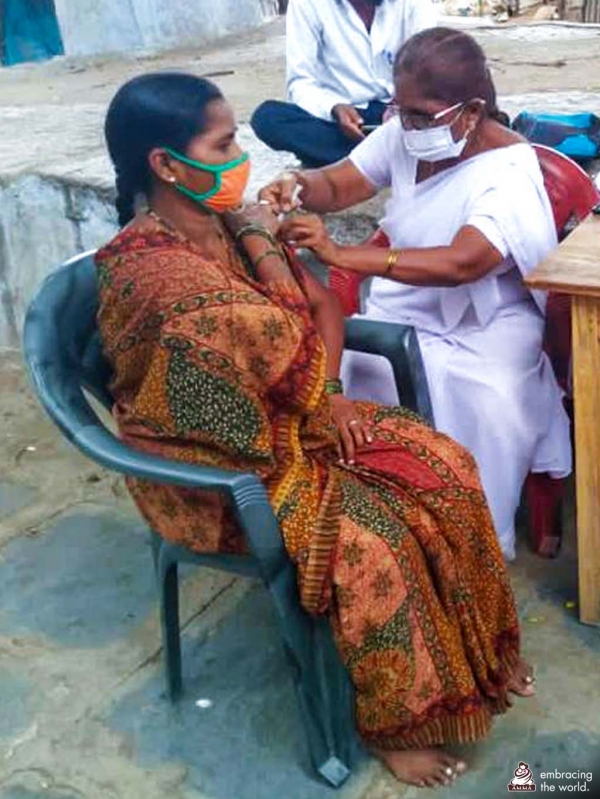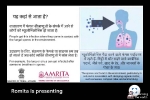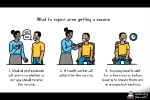Declared a Tribal Center of Excellence by India’s Ministry of Tribal Affairs, Amrita Vishwa Vidyapeetham has gathered a team to help share correct information to the communities where it operates. The university’s AmritaCREATE and Amrita School of Ayurveda are reaching out to villagers to support government initiatives and get people vaccinated. This follows in the footsteps of earlier campaigns to bring Covid awareness to villages and tribal communities.
Doctors with Amrita Institute of Medical Sciences (Amrita Hospitals) created virtual training sessions to share information with the university’s village workers, which included about 40 participants who were community health workers, teachers, village coordinators and field workers. These on-the-ground staff have won the trust of many villagers, as they have been at work in the locations for several years.
“There was a positive impact on the villages with many trainees reporting that more villagers were getting registered and vaccinated,” shares Dr Romita Jinachandran, who led the team at Amrita.
“They were happy to have face-to-face online interactions with the doctors and felt more comfortable in spreading valid information. They requested the doctors to keep sharing new findings on COVID-19 and the vaccine.”
Shantamma is a tuition teacher with AmritaCREATE in the village of Kurvakurda in Karnataka who took part in the training. When the government vaccination camp arrived in her community, she quickly went to get her first dose, but saw others were not so keen. With a picture of her own vaccination in hand, she went house to house calling all eligible to get to the camp. By the end of the day, every available dose was administered.
“Health awareness has to be provided to the people before and after vaccination,” explains Shantamma. Both her sister and brother-in-law had coronavirus and fully recovered.
“Villagers must know that we need to continue to be cautious and always wear a mask, wash hands, maintain social distance and have good ventilation in our homes.”
Amrita’s virtual training sessions include how to convey awareness to the general public, teleconsultation with Amrita Hospitals and Amrita School of Ayurveda, and one-on-one sessions with trainees to monitor the impact of the training in each community and track what the Covid situation is there.
“We got a lot of interesting questions during the Q&A and teleconsultation sessions. Some questions were related to mucormycosis, vaccine efficacy and safety, vaccine relation to co-morbidities, pregnancy, lactation, etc,” says Dr Jinachandran.
“This led us to believe that the trainees were aware of the new complications related to Covid, but this was causing confusion and panic amongst the people. Awareness sessions were shared to overcome such fears, too.”
So far, the training has covered villages in Punjab, West Bengal, Himachal Pradesh, Haryana, Odisha, Rajasthan, Uttar Pradesh, Uttarakhand, Andhra Pradesh, Bihar, Chhattisgarh, Jharkhand, Karnataka and Telangana.
Doctors from Amrita Hospitals who also took part include:
• Dr Aveek Jayant - Head of the Department of Cardiac Anesthesia
• Dr Sreelakshmi - Assistant Professor in Cardiac Anesthesia
• Dr. Mahesh - Professor in Pediatric Cardiology
• Dr. Vidya - Assistant Medical Administrator and Consultant and Assistant Professor, Cytogenetics
• Dr. Jahnvi Jayesh Bhate - Assistant Professor, Department of Ear, Nose & Throat
• Dr. Rachna Goel - Operating Room Manager
Amrita School of Ayurveda doctors are:
• Dr. Shyamasundaran K - Assistant Professor, Kriya Sharir
• Dr. Sushma- Assistant Professor, Shalakya Tantra
“Presently, there is a vaccine shortage issue in the villages, but the registration process has been completed. Vaccine hesitancy has significantly come down after the awareness and telemedicine sessions,” concludes Dr Jinachandran.
Photo 1: Shantamma in the village of Kurvakurda in Karnataka shared this photo of her vaccination to encourage others in her community to get the shot.
Photo 2: A screenshot from the training session on Mucormycosis (Black Fungus).
Photo 3: A young man in Harirampura, Rajasthan goes for his vaccination.
Photo 4: Info to prepare for the experience of a COVID-19 vaccination.








